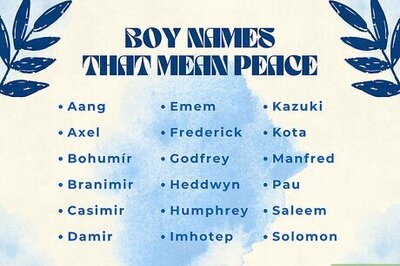
views
The British government on Sunday applauded the conviction and death sentence given to Saddam Hussein for war crimes in Iraq. But Amnesty International questioned the fairness of the trial.
''I welcome that Saddam Hussein and the other defendants have faced justice and have been held to account for their crimes,'' Britain's Foreign Secretary Margaret Beckett said in a statement.
''Appalling crimes were committed by Saddam Hussein's regime. It is right that those accused of such crimes against the Iraqi people should face Iraqi justice,'' Beckett said from India, where she was on an official visit.
''Today's verdicts and sentences by the Iraqi Higher Tribunal come at the end of a trial during which evidence has been offered and challenged in the full glare of media scrutiny,'' she said.
Malcolm Smart, Amnesty's director of the Middle East and North Africa, said in a telephone interview: ''Throughout Saddam's rule, we reported on massive abuses in his country. We felt it was important that he and others be held accountable. But even he deserves a fair trial, and the proceeding in Baghdad failed to meet the necessary fail trial standards.''
Saddam verdict important milestone: US envoy
The US ambassador to Iraq, Zalmay Khalilzad, said the guilty verdict and death sentence imposed on Saddam Hussein and two aides on Sunday was "an important milestone" towards building a free society in Iraq.
"The judges, prosecutors and defence attorneys in this case all showed courage in the face of intimidation," Khalilzad said in a statement. "Their determination to pursue justice is a signal that the rule of law will prevail in Iraq despite the difficult situation that the country now faces."
Three defence lawyers have been murdered since the start of the trial in the US-backed tribunal; the original chief judge resigned, protesting about government interference.
"Today is an important milestone for Iraq as the country takes another major step forward in the building of a free society based on the rule of law," Khalilzad said.
"Although the Iraqis may face difficult days in the coming weeks, closing the book on Saddam and his regime is an opportunity to unite and build a better future." Saddam Hussein was sentenced to hang at a lightning session of the court in Baghdad.
Iranians praise Saddam's death sentence
Iranian officials praised on Sunday's death sentence against ousted Iraqi leader Saddam Hussein and said they hoped he would continue to be tried for other alleged crimes against humanity.
''The death sentence for Saddam was a matter of happiness for me. He was a war criminal and a vampire in the current history,'' said Kazen Jalai, a spokesman for Iran's parliamentarian committee of national security and foreign policy.
Just after Saddam was sentenced in a Baghdad courtroom, Iran' state-run television interrupted its regular program to announce: ''A court in Iraq sentenced Saddam, the collapsed dictator to death.''
For many Iranians, the memories were still fresh from of the destruction they suffered after Saddam invaded their country in 1980, setting in motion a deadly war that would last eight years.
Before Saddam's verdict was announced, Iran's Foreign Ministry spokesman Mohammad Ali Hosseini said he felt that execution was the minimum sentence expected.
Saddam verdict upsets some Arabs
Saddam Hussein's death sentence on Sunday evoked satisfaction in countries he invaded, sorrow among his Palestinian admirers and resentment from some Arabs who see him as the victim of a US-inspired show trial.
Kuwaitis, who suffered a seven-month Iraqi occupation in 1990-91, applauded the Baghdad court's decision that the former Iraqi president should hang for crimes against humanity.
"This is good news," said Kuwaiti political analyst and former oil minister Ali al-Baghli. "Saddam deserves to be hanged because of the atrocities he inflicted on his people for the past 35 years and on his neighbours also. He sent millions of people to their deaths."
Iran said it hoped Saddam, who was convicted over the deaths of more than 148 Shi'ite men from the Iraqi town of Dujail, would still be brought to book for offences it accuses him of committing during the 1980-88 Iran-Iraq war.
"Saddam's execution is the minimum sentence that should be issued, but it does not mean that his other crimes, particularly the imposed war, should be ignored," Iranian Foreign Ministry spokesman Mohammad Ali Hosseini said ahead of the verdict.
Iraq govt hails verdict, Sunnis complain
Iraq's Shi'ite-led government said Saddam Hussein had got what he deserved when an Iraqi court sentenced him to hang, but a senior Sunni Arab member of parliament dismissed Sunday's verdict as political.
The discrepancy highlighted sectarian divisions that have turned violent since US forces overthrew Saddam in 2003. "He is facing the punishment he deserves," Prime Minister Nuri al-Maliki, a Shi'ite Islamist, said in a televised address to the nation two hours after the verdict.
A senior Sunni Arab parliamentarian, who asked not be quoted by name for fear of sectarian reprisals, said, however: "This is a political verdict from a political court." Maliki said last month that Saddam's execution could not come soon enough, fuelling charges of political interference. But on Sunday he emphasised the independence of the court system.
"Justice is stronger than its enemies and the law will win," Maliki said. "For me his (Saddam's) sentence does not represent anything because executing him is not worth the blood he spilled but it may bring some comfort to the families of the martyrs."
"Executing Saddam will not bring a loved one back from the dead or a senior cleric like Sadr," he added, referring to Ayatollah Mohammed Sadeq al-Sadr who was killed in 1999.
The murdered cleric's son Moqtada al-Sadr, a key supporter of Maliki, is also leader of the Mehdi Army militia accused by Sunnis of some of the worst of recent death squad killings. Deputy Prime Minister Barham Salih, a Kurd, told Reuters: "The court has proven to be professional and just. Saddam was given the justice he denied to the people of Iraq over 35 years.
"I hope the verdict will bring closure to this tragic and brutal episode in Iraqi history. We must never forget and we must always be vigilant never to let tyranny rise here in Iraq ever again -- but it's time to move on.




















Comments
0 comment